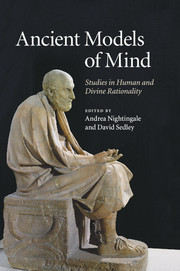Book contents
- Frontmatter
- Contents
- List of contributors
- Introduction
- 1 Plato on aporia and self-knowledge
- 2 Cross-examining happiness: reason and community in Plato's Socratic dialogues
- 3 Inspiration, recollection, and mimēsis in Plato's Phaedrus
- 4 Plato's Theaetetus as an ethical dialogue
- 5 Contemplating divine mind
- 6 Aristotle and the history of skepticism
- 7 Stoic selection: objects, actions, and agents
- 8 Beauty and its relation to goodness in Stoicism
- 9 How dialectical was Stoic dialectic?
- 10 Socrates speaks in Seneca, De vita beata 24–28
- 11 Seneca's Platonism: the soul and its divine origin
- 12 The status of the individual in Plotinus
- A. A. Long: publications 1963–2009
- Bibliography
- Index
4 - Plato's Theaetetus as an ethical dialogue
Published online by Cambridge University Press: 06 December 2010
- Frontmatter
- Contents
- List of contributors
- Introduction
- 1 Plato on aporia and self-knowledge
- 2 Cross-examining happiness: reason and community in Plato's Socratic dialogues
- 3 Inspiration, recollection, and mimēsis in Plato's Phaedrus
- 4 Plato's Theaetetus as an ethical dialogue
- 5 Contemplating divine mind
- 6 Aristotle and the history of skepticism
- 7 Stoic selection: objects, actions, and agents
- 8 Beauty and its relation to goodness in Stoicism
- 9 How dialectical was Stoic dialectic?
- 10 Socrates speaks in Seneca, De vita beata 24–28
- 11 Seneca's Platonism: the soul and its divine origin
- 12 The status of the individual in Plotinus
- A. A. Long: publications 1963–2009
- Bibliography
- Index
Summary
It is a privilege to be able to dedicate this essay to my teacher, mentor, colleague, co-author and friend Tony Long, with pleasant memories of many past conversations about the Theaetetus.
The Theaetetus is by common consent one of the classic texts in the history of epistemology. But would Plato himself understand and endorse this description? If “epistemology” were defined simply as “the study of epistēmē,” it would be easy to answer affirmatively, epistēmē being after all the official topic of the dialogue. But does Plato recognize any area of philosophy that would correspond to what we call epistemology?
For the later Platonist tradition, “logic” had come to constitute one of the three parts of philosophy, alongside ethics and physics; and cognition of truth (often under the rubric “the criterion of truth”) was in its turn recognized as a primary focus of “logic”. Hence Platonist schematizations had no trouble in classing the Theaetetus as a “logical” dialogue if they so wished. The epitome of Plato preserved by Stobaeus (Ecl. 2.49.8–25) is able to say that the goal of “becoming like god” is set out by Plato in the Timaeus from the point of view of physics (φυσικῶς), in the Republic from the point of view of ethics (ἠθικῶς), and in the Theaetetus from the point of view of logic (λογικῶς).
- Type
- Chapter
- Information
- Ancient Models of MindStudies in Human and Divine Rationality, pp. 64 - 74Publisher: Cambridge University PressPrint publication year: 2010



